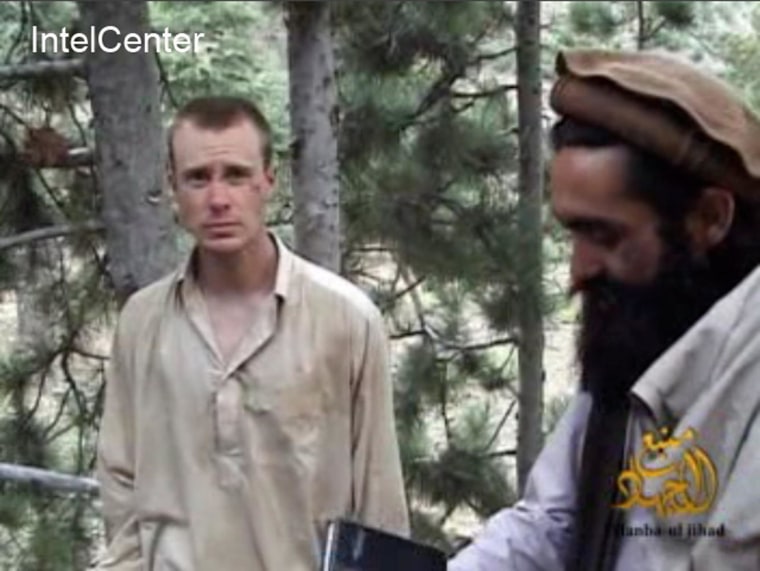PESHAWAR, Pakistan — The Afghan Taliban on Saturday said that U.S. Army Sgt. Bowe Bergdahl doubted that he was being released to the U.S. after almost five years in captivity.
According to the Taliban, they had informed Bergdahl a few days ago about his likely release, but he didn't believe it.
Two years ago, Bergdahl was handed over to members of the Quetta Shura, or council — the decision-making body of the militants — for his scheduled release in exchange for five Taliban commanders being held by the U.S. at Guantanamo Bay, said a senior Taliban commander affiliated with the Haqqani network, a major militant faction of the Afghan Taliban.
"It is war in which they kill us and we kill them, but we did whatever we could to make him happy and return with good memories"
"The talks at that time failed, and he was again handed over to his captors, and that's why he didn't trust when [he] was told about his likely release," the Taliban commander told NBC News on the phone from Afghanistan.
But this time, “our talks finally proved successful for [a] prisoners' swap. We returned our valued guest to his countrymen and they released our people.” said the Taliban commander.

Pleading anonymity, he said talks for a prisoners' swap had been going on for several weeks.
He said a Muslim country that has sympathies with the Taliban played an important role in bringing together the Taliban and U.S. officials to broker the prisoner exchange. He did not name the country involved, but U.S. officials and the Taliban confirmed that Qatar helped with the talks.
"It is war in which they kill us and we kill them, but we did whatever we could to make him happy and return with good memories
The Taliban commander said Bergdahl had mostly been held in the tribal areas between Pakistan and Afghanistan after his kidnapping from Afghanistan’s Paktika province in June 2009.
After Bergdahl’s release deal was finalized, he was taken to Ali Sher town in Afghanistan's eastern Khost province by a third party, and then delivered to the American forces.
“We don't know further what happened to him," the Taliban commander said.
Meanwhile, an official statement from the Taliban, which calls itself the Islamic Emirate of Afghanistan, focused on the "leaders" it said were being released in exchange for Bergdahl.
"They were released as a result of indirect talks between the Islamic Emirate and the US which has been going for some time with the mediation of Qatari government," according to the statement translated into English by NBC News. "They will live normal lives in Qatar with their families."
Traditional turban
The Taliban commander who spoke to NBC News directly said Bergdahl was given a traditional Afghan turban as a parting gift before his release.
"It is war in which they kill us and we kill them, but we did whatever we could to make him happy and return with good memories," he said.
But in videos released by the Taliban that have been criticized as propaganda, Bergdahl pleaded to go home.
In a 2009 video after his capture, Bergdahl said he was “scared,” and in later videos he is seen gaunt and blindfolded.
In a 2010 video he pleads, “Let me go … I’m a prisoner. I want to go home. Every day I want to go home. The pain in my heart to see my family again doesn’t get any smaller.”
The Department of Defense declined to comment on the Taliban’s claims, saying it is focused on getting Bergdahl healthy and back in the U.S. before getting into the details of his imprisonment.
“Right now first priority is his medical care; we’re going to proceed at a pace he’s comfortable with.”